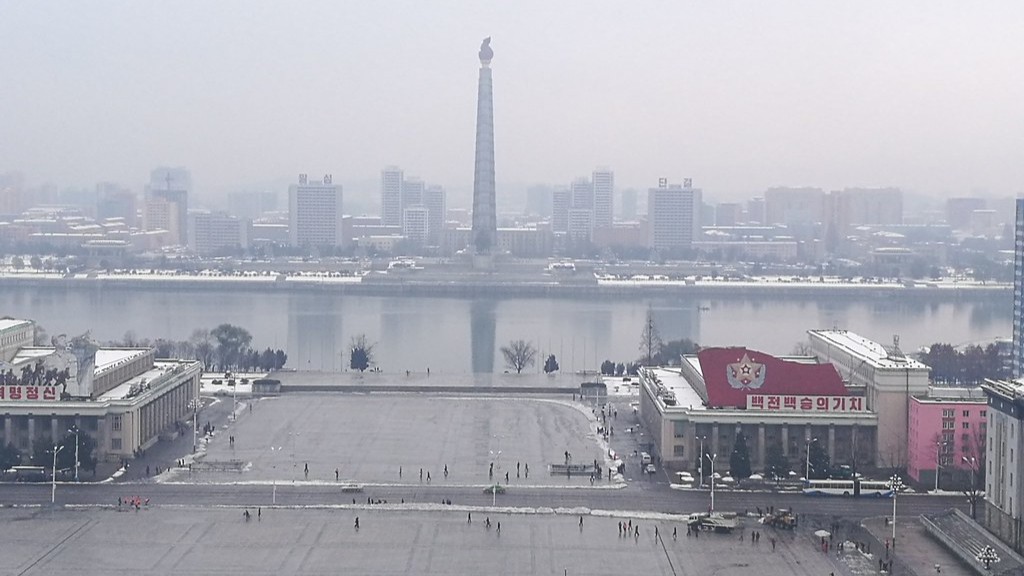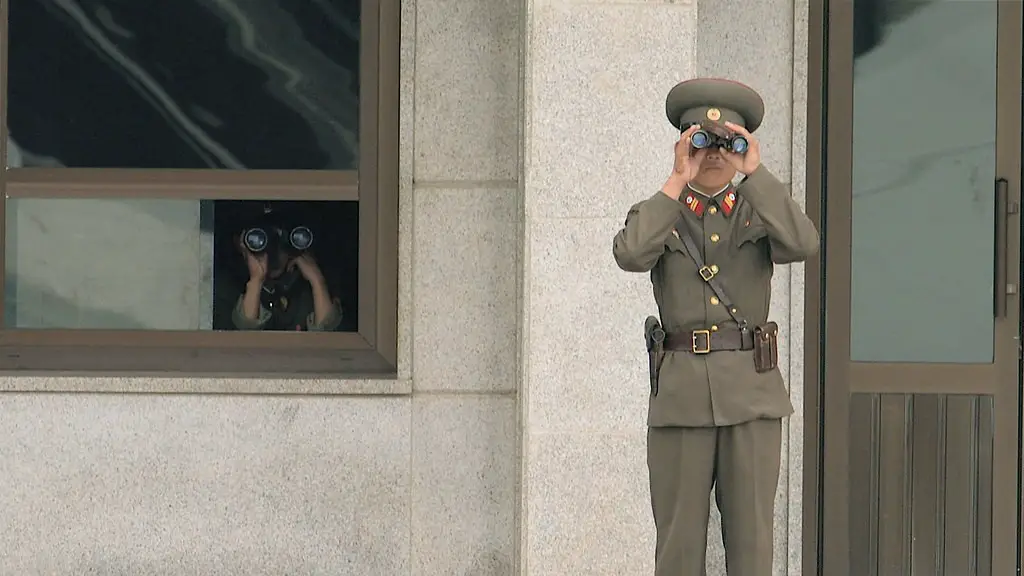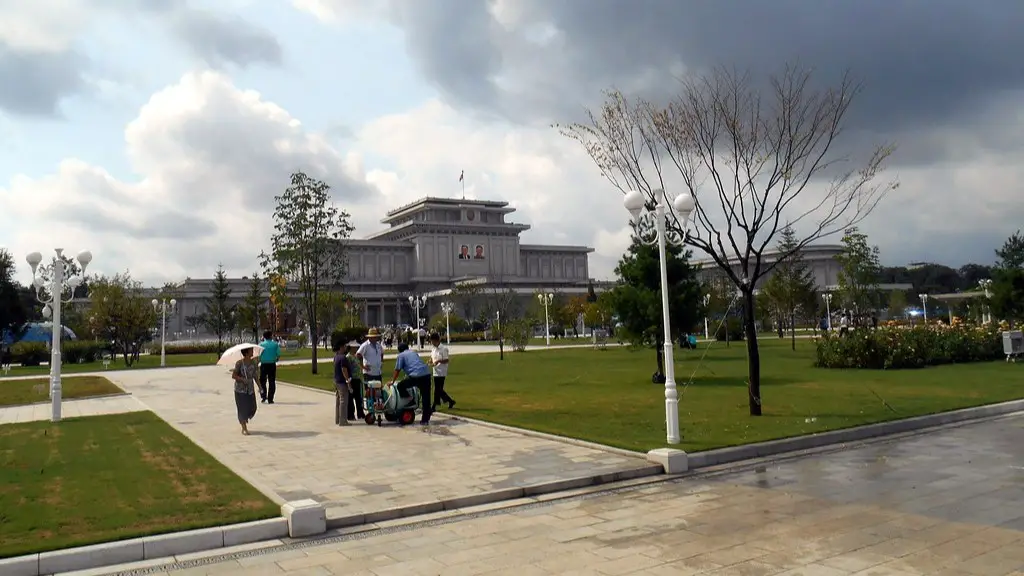History and Background Information
At the start of 2017, tensions between the United States and North Korea have markedly increased. Since taking office, President Trump has maintained a hostile stance towards the North, frequently claiming he is ready to use military force to solve the Korea crisis if necessary. This has further amplified the already-elevated conflict level between the two nations.
Throughout history, North Korea has pursued a policy of self-sufficiency and self-defense, as evidenced by their nuclear weapons program and hostile rhetoric towards the United States and its allies. Despite decades of diplomatic efforts, few solutions to the Korean Crisis have been achieved, leaving many nations vulnerable to potential conflict.
The current crisis has been building for years and is rooted in strong historical and political discord between the United States and North Korea. North Korea has long viewed the US and its allies as a threat to their sovereignty, while the US has maintained an unyielding stance against the North’s nuclear development.
The US has imposed sanctions and sanctions on North Korea in an effort to put pressure on the regime, while North Korea has retaliated by threatening to launch a nuclear attack against the US and its allies. This has caused a considerable strain between the two nations and pushed them to the brink of war.
Relevant Data and Perspectives from Experts
At this stage, it is difficult to predict when and if a war with North Korea will start. While the possibility of war remains a live threat, there are several factors which suggest that a war between the two countries is highly unlikely.
Firstly, the economic costs associated with war would be high. According to a 2019 report from the Council on Foreign Relations, the economic consequences of a war with North Korea would be “devastating,” resulting in millions of casualties and the displacement of millions of people.
Secondly, both countries have an interest in avoiding war, as it would undermine their global standing and likely result in heavy losses. Furthermore, there is a strong potential for the conflict to escalate quickly and spread beyond North Korea and the US to include China, Japan, and other global powers.
Finally, the US has already implemented stringent economic sanctions against North Korea in an attempt to pressure the regime into complying with US demands. The US is hoping to use economic pressure and diplomacy to resolve the crisis without resorting to war, but it is unclear whether the North will make the necessary concessions.
The most common expert opinion is that war is unlikely, at least in the near future, but the crisis is fluid and unpredictable and could quickly escalate.
Own Insights and Analysis
In my view, any potential war with North Korea is likely to be avoided or at least postponed in the near future. President Trump has expressed a willingness to use military action against the North, but so far he has been reluctant to follow through on his threat. Furthermore, the economic costs associated with a war are far too high for either side to realistically consider.
Additionally, the US is attempting to employ diplomatic measures and economic sanctions to resolve the crisis. While the effectiveness of these measures is yet to be seen, there has been a noticeable decrease in hostile rhetoric from the North in recent months, which suggests that these measures are having some effect.
Finally, the US and its allies are highly unlikely to launch an unprovoked attack on North Korea due to the risks and costs associated with such a conflict. Indeed, the US is still heavily embroiled in conflicts in the Middle East, and starting yet another costly war would only further weaken its already strained military resources.
Preparations for War
While a war with North Korea is unlikely in the near future, both the US and North Korea have begun making preparations in case of a conflict. The US has already deployed a fleet of warships to the region, while North Korea has increased its military presence near the demilitarized zone and issued stern warnings against military action.
A potential war could quickly spread beyond the Korean peninsula and involve other global powers, such as China and Japan. This would further complicate the situation, as any military action taken against North Korea would draw quick retaliation from China and other allies, who would likely join the conflict in support of the North.
Furthermore, the US has bolstered its regional military forces and is conducting joint military exercises with its allies in the region in preparation for a potential conflict. The US is also seeking to build a regional coalition of nations to counter North Korea’s nuclear ambitions and is working to strengthen diplomatic ties with South Korea and Japan.
While these efforts are encouraging, the US and its allies are still a long way from achieving the level of preparedness necessary to launch a successful offensive against North Korea.
The Risk of a Nuclear Conflict
The possibility of a nuclear conflict remains a major concern and could easily escalate into a full-scale war. North Korea has continued to bolster its nuclear capabilities and is said to have a stockpile of powerful weapons and the means to deliver them. This has prompted the US and its allies to take a more aggressive stance on the Korean crisis, as any action taken against North Korea could have catastrophic consequences.
The US has been able to contain North Korea’s nuclear ambitions thus far, but any misstep or miscalculation could quickly lead to war. Furthermore, North Korea has already declared itself a nuclear power and is unlikely to give up its nuclear weapons without a fight, making a diplomatic solution all the more difficult.
At this point, it is impossible to predict when a war with North Korea will start, but the risks and costs associated with such a conflict are vast and should be taken seriously. The US and its allies must exercise caution and maintain tight diplomacy and economic sanctions in order to prevent a disastrous war.
Implications for World Stability
A war with North Korea could have serious implications for global stability and international law. If a war were to break out, it could quickly spin out of control and draw other nations into the conflict. This would cause widespread destruction and destabilize the entire region, at an extremely high human and economic cost.
It would also set a dangerous precedent for international law and weaken the international community’s ability to respond to similar crises in the future. A war with North Korea would be catastrophic and would cause untold destruction, both in the region and around the world.
Finally, a war with North Korea could have long-lasting political and economic consequences for the US and its allies. It would likely tarnish the US’s global standing, alienate allies, and weaken its ability to project its power across the world. In short, a war with North Korea would be a disaster of epic proportions.
Uncertaintiy Around US’ Response
The unpredictable nature of US foreign policy makes it difficult to predict how President Trump would react to a potential war with North Korea. It is widely believed that the President is committed to achieving a diplomatic solution, but he has also made numerous statements suggesting that he is willing to use military force if necessary.
The President has also been known to contradict his own statements and to act impulsively. This raises questions about the US’s commitment to a diplomatic solution and suggests that the President may be willing to resort to military action in order to resolve the crisis.
Furthermore, any decision to use military force would require the approval of Congress, and it is unclear if the President would be able to convince Congress to support such an action. The US is also facing a leadership vacuum following the departure of Secretary of State Rex Tillerson, which could make it even more difficult to achieve a diplomatic resolution.
At this stage, it is impossible to predict how the US would respond to a war with North Korea. Nonetheless, it is essential that the US continues to pursue diplomatic solutions and avoid military action in order to achieve the best possible outcome.
Impact of North Korea’s Provocation
It is clear that North Korea’s hostile rhetoric and saber-rattling has been a major factor in escalating tensions in the region. The North has frequently threatened to launch a nuclear attack against the US and its allies, and its refusal to engage in meaningful diplomatic talks has only heightened the conflict.
North Korea’s escalation of the crisis has been met with stiff resistance from the US and its allies, who have responded with economic sanctions and military exercises. The US has also threatened to use military force if necessary, though it is unclear if the President would actually follow through on his threat.
Ultimately, North Korea’s provocations have only further weakened the potential for a diplomatic resolution and have pushed the US and its allies closer to a war with North Korea. It is essential that North Korea refrain from further provocation if it hopes to avoid a conflict.
Implications for US Foreign Policy
Given the gravity of the situation, it is essential that the US formulate a cohesive and effective foreign policy approach to the Korean crisis. The US’s current policy of a combination of sanctions and diplomacy is unlikely to be successful in the long run, and it is essential that the US come up with a new strategy to deal with the crisis.
The US must also recognize that North Korea’s nuclear ambitions are motivated primarily by self-preservation, and it must consider ways to address the North’s security concerns without resorting to military action. Dialogue and diplomacy remain the best tools available to the US in this situation, and it is essential that the US and North Korea continue to pursue a peaceful resolution to the crisis.
Finally, the US must recognize that any potential war with North Korea would have disastrous consequences and should be avoided at all costs. War should only be an absolute last resort, and the US must pursue all other avenues before escalating the conflict.





